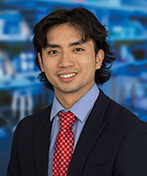
School: Mesa Community College
Hometown: Cheyenne, Wyoming
Daily Mentor(s): Sophia Carvalho, PhD
PI: Timothy Whitsett, PhD
Helios Scholar
There is an unmet need to include rural and historically underserved (R/U) populations in contemporary science and medicine. Rural Arizona communities suffer preventable chronic diseases and disabilities at disproportionately higher rates compared to urban communities. We seek to increase R/U participation by translating science into layman’s terms, ensuring accessibility to individuals of all backgrounds and communities at risk. We implemented this strategy to support the Huentelman Lab’s MindCrowd Mobile Laboratory (MLab), which has suffered from high cancellation rates (averaging 23.3%) since inception. We created and revised written materials to aid MLab field scientists in retaining participants, answering questions, and collecting samples for collaborative studies across TGen. A survey of previous MLab participants, conducted by fellow Helios Scholars, revealed that only one respondent self-identified as belonging to an underrepresented minority (n = 95). We anticipate that the new materials will decrease cancellations by 5-10% and increase participation, particularly by those of minority populations. Another survey, polling principal investigators and research scientists, indicated mixed opinions regarding factors influencing R/U participation and inclusion in future TGen studies. While the Science Writing Team at TGen is capable of facilitating the communication process between scientists and the public, a collaborative effort from all genetic and genomic stakeholders is required for holistic representation within this space. In the short-term, this will necessitate further streamlining of the consent process for the MLab; and in the long-term, larger-scale efforts will be required to build trust between researchers, clinicians, and the communities we serve.